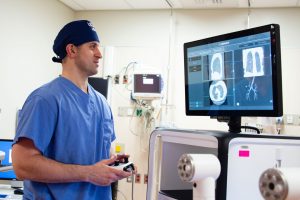November is Lung Cancer Awareness Month.
Did you know that lung cancer kills more Americans than any other cancer combined?
In fact, lung cancer is the deadliest cancer because most patients don’t have symptoms until the cancer is advanced, spreading from the lungs throughout the body.
To spur earlier diagnosis and save more lives from lung cancer, UConn Health’s lung cancer experts are calling on you to know your personal risk of lung cancer and to take swift action.
People who currently smoke have the greatest risk of lung cancer, though lung cancer does not discriminate and can also occur in people who have never smoked. In addition, you are also considered high risk if you are a former smoker who quit within 15 years. Other risks include frequent or prolonged exposure to secondhand smoke, radon gas, asbestos or other carcinogens as well as a family history of lung cancer.
Lung screenings of high-risk patients using low-dose computed tomography (CT) scans and minimally invasive techniques can help detect a suspicious lung lesion and diagnose more people earlier to improve their odds of surviving lung cancer.

UConn Health’s Dr. Omar Ibrahim, director of thoracic oncology and interventional pulmonology, urges current and former heavy smokers to get screened for the disease with a low-dose CT scan to improve their chance of an early diagnosis and long-term survival. Also, he calls on all smokers of tobacco and users of other potentially harmful e-cigarettes and vaping products to immediately stop or seek the assistance of a smoking cessation program.
“Our goal is to find lung cancer at its earliest stage so we can have options to treat it and cure it,” Ibrahim says.
When lung cancer is detected early, survival rates improve exponentially according to Ibrahim.
“We have immensely improved a patient’s time to diagnosis and treatment, as well as the overall quality of care they receive,” says Ibrahim. “Plus, our Lung Cancer Program’s advanced diagnostic imaging and rapid-sequence genetic testing has allowed us to get patients the personalized therapy in the most effective way possible.”
According to Ibrahim, UConn Health is one of a few institutions in the Northeast to consolidate how they care for lung cancer patients.
“Rather than having patients visit multiple physicians in different locations on our campus, we focus all our care for lung cancer patients in one multidisciplinary clinic,” says Ibrahim, who led the specialized clinic’s development. “This allows for ease of care and greater patient satisfaction and increases the patient’s knowledge.”
To make an appointment at the Lung Cancer Screening Program of the Carole and Ray Neag Comprehensive Cancer Center, call 844-777-LUNG or visit its website to learn more.


